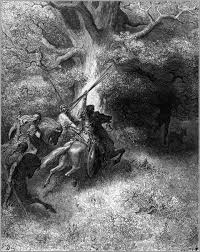 Click here to read “Psalm Three: Translation of the Song”
Click here to read “Psalm Three: Translation of the Song”
Structure and meaning are striking complements in Song 3; where and when words occur in the verses sound the singer’s intent as surely and harmoniously as the strings of his lyre voice their notes together. Thus: verses 2 and 3 contain three repetitions of the word “abundant” (the three Hebrew words for “abundant” differ from each other slightly but share a common root: ר.ב.ב. ) – the singer is lamenting the number of his foes. He feels threatened both physically and spiritually, as he declares how his enemies afflict his “soul’ with their taunt, “There is no deliverance for him in God” (v. 3). Certainly the word “deliverance” (Hebrew: יְשׁוּעָתָה ) is deliberately chosen by his foes to show their derision. But, as the singer claims the verb “deliver” in verse 8 and the noun “deliverance” in verse 9, calling upon God to save him, he proves his victory over his enemies. These two variations, verb and noun, building as they do upon his foes’ scornful use of “deliverance”, sound a three-word chord that easily overpowers the foes “abundant” numbers. Their scorn the singer transforms into his affirmation of belief in God’s deliverance of him. That his victory is a moral one, his faith in God makes clear:
No awe have I of tens of thousands – a nation – that,
surrounding [me], set [themselves] upon me.
(v. 7)
That it is a physical victory as well, he suggests in verse 8, declaring of God, “You have struck down all my enemies [on the] cheek, the teeth of the wicked You have broken”. God’s reprimand has deprived the singer’s foes of clarity of speech and the ability to chew. Thus they are deprived of both communication and nourishment, just as they had tried to deny the singer his sustenance — his faith, that is, that God will respond to and save him.
The first verse of the song says it was composed by King David as he fled from his son, Absalom. The name, Absalom, means “my father is peace”. The bitter irony, never anticipated by the rebellious son, is that his revolt against his father provokes not David’s vengefulness but, on the contrary, his compassion. Absalom’s betrayal actually proves what he would deny – the truth of his name. For David’s song ends, not with a triumphant declaration of his victory over Absalom, but, rather, with his attributing his deliverance to God. And, showing the true quality of kingship, he invokes God’s blessing not upon himself but upon the entire people, Israel:
To Adonai deliverance [belongs]; upon Your nation, Your blessing.
(v. 9)